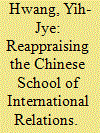|
|
|
Sort Order |
|
|
|
Items / Page
|
|
|
|
|
|
|
| Srl | Item |
| 1 |
ID:
179326


|
|
|
|
|
| Summary/Abstract |
This article aims to revisit the enterprise of the Chinese School (CS) of IR and discuss how it should be viewed and handled in the discipline, specifically from within the analytical framework of the power/resistance nexus put forward by Foucault, Bhabha, and Spivak. The argument of this article is twofold. Firstly, the CS attempts to reinvigorate traditional Chinese concepts (that is, humane authority, the Tianxia system, and relationality), which mimick Western mainstream IR. These concepts channel the CS into a realist notion of power, a liberal logic of cosmopolitanism, and a constructivist idea of relationality. Thus, the CS uses against the West concepts and themes that the West currently use against the non-Western world. Nevertheless, as the second part of the argument will demonstrate, the enterprise of the CS can still be justified because it can be regarded as a reverse discourse; mimicking yet altering the original meanings of the taken-for-granted concepts, ideas, and principles used by mainstream IR scholars. Moreover, with the judicious use of strategic essentialism, the CS can potentially be one local group in a wider effort to contest diffused and decentred forms of Western domination through linking various struggles to form a unified ‘counter-hegemonic bloc’ of post-Western IR in the discipline.
|
|
|
|
|
|
|
|
|
|
|
|
|
|
|
|
| 2 |
ID:
190926


|
|
|
|
|
| Summary/Abstract |
Since the second half of the 20th century, the notions of hybrid, hyphenated and transcultural identity have found urgent currency for scholars interested in the Arab Anglophone literary movement. Several books and anthologies have situated Arab Anglophone writers within diaspora and multicultural studies. In particular, the fascination of Western academia has augmented comfortable diffusion and propagation of writers and critics endorsing these concepts. Whilst representing trans-cultural and hybrid identities is of immense importance when assiduously addressing issues of diaspora, migration, exilic consciousness, and dislocation, it has also become a ‘survival’ strategy for some ‘minority’ writers. The article challenges the claim that Arab Anglophone women writers’ depiction of hybrid identity is an expression of their lamentable state of affairs. It rather argues that those writers espouse strategic construction of hybridized identity to serve extrinsic aims related to recognition, canonization, and readership. This depiction is thus closer to an ‘essentialist practice’ than to a trans-cultural hybrid identity construction.
|
|
|
|
|
|
|
|
|
|
|
|
|
|
|
|
|
|
|
|
|